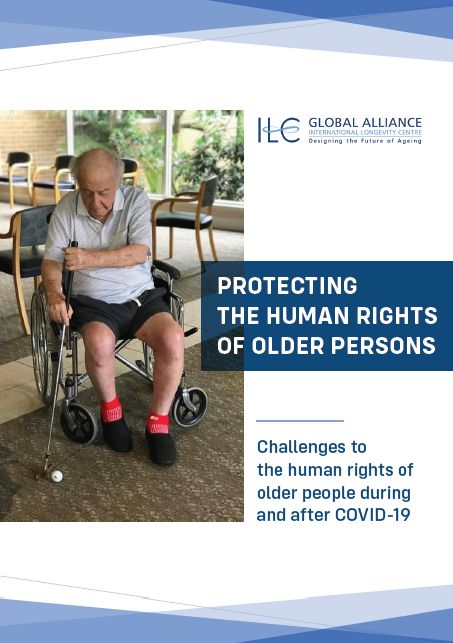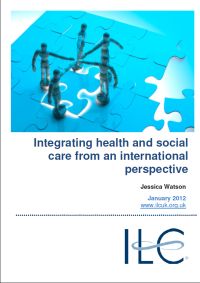Care

One of the aspects of an ageing population is the rise in the oldest old.
The main implication is the significant growth in long-term social care needs, given the decline in physical and mental capacities evident among many of the oldest old. These chronic needs are by definition broader than the acute needs met by the healthcare system. Presently, they are met primarily through either residential or nursing care – at a high cost to local authorities and individuals – or through informal care by friends and relatives.
Dynamic knowledge synthesis in local networks for coherent elderly care
We are getting older and more diverse, and that brings challenges. We cannot solve these challenges through healthcare alone. We also need municipalities, schools, companies, housing associations and older people themselves to achieve an age-friendly society. This requires cross-domain collaboration. But how can we achieve that?
25 April 2024
Update on the Physiotherapy Assessment Camp (PAC) by ILC-India
From 2018, ILC-India started conducting this programme called “Physiotherapy Assessment Camps” in different parts of Pune city in collaboration with DES Brijlal Jindal College of Physiotherapy. Till date, around 1000 seniors have been covered under this programme, including follow-up visits.
November 2022
ILC-Japan has been promoting public-industry collaboration to enhance support for older adults in daily living. After conducting studies with community support coordinators and creating a tool with tips to make improvements, we are now in the implementation stage to build actual collaboration between supermarkets and municipalities.
November 2022
Jikka House: an innovative senior living in Japan
We interviewed two older Japanese women who had moved from Tokyo to Izu Highland, a popular retreat for city dwellers, to build their private house and restaurant. They contribute to building a community by serving lunch and delivering meals to local residents.
July 2022
Enjoying Life Approach on location: Between dream and deed
On May 10, 2022, the conference ‘Enjoying Life Approach on location' took place in Arnhem (in the Netherlands), as a completion of the eponymous project.
22nd May 2022
The “What Do Older People Want from their Healthcare?” project, conducted by the National Ageing Research Institute (NARI) on behalf of the Victorian Department of Health (DH), Australia, provides valuable insights into what older Victorians want, need and expect across each domain of ageing and highlights how this changes across the care continuum.
20th May 2022
Everyone thrives in an inclusive age-friendly society
The Netherlands Scientific Council for Government Policy (WRR) recently put a magnifying glass on elderly care in four countries: Japan, England, Germany and Denmark. One of the researchers is Tineke Abma, professor of Participation of Older People at the Leiden Medical University Centre and Executive-Director of Leyden Academy on Vitality and Ageing. What lessons can be learned from this research?
22nd April 2022
Stereotype approach to elderly migrants does not do justice to diversity
The specific cultural background of older migrants does not appear to determine their care wishes and needs. The mutual diversity is great, which means that wishes and needs are very personal and partially depend on where and how someone has lived.
August 2021
ILC-GA Position Statement on COVID-19
Following a meeting of its members on Thursday, 7 May 2020, the ILC Global Alliance has prepared a Position Statement on COVID-19.
7th May 2020
The experiences of seniors during the Corona/Covid-19 crisis
The Leyden Academy on Vitality and Ageing and ILC-Netherlands research project focusses on the impact, measures and restrictions of the corona virus on the senior population. The project intends to focus on how a diverse group of seniors (aged 60+) experience the virus and the measures taken. How do they perceive the risks and how does is impact their daily lives?
15th March 2020
Art for Senior Positive Health and Well-Being
What value does art (such as dance, drawing, music, song, poetry, theatre etc.) have on an individual, social and societal level? With the two-year research 'Art for Senior Positive Health and Well-Being. Capturing the Impact of Art-based Initiatives and Programmes' Leyden Academy on Vitality and Ageing and Amsterdam UMC look into the value of art in long-term care by describing existing art initiatives in care, evaluating the impact and looking for the underlying working principles.
20th January 2020
International Symposium in Sao Paulo to share innovations from Australia and the Netherlands
On October 17, ILC-BR organized a Symposium with three international speakers in São Paulo. The event took place in the auditorium of Iamspe (Institute for Medical Assistance to the Public Servant of the State of São Paulo).
21st October 2017
ILC-BR holds its 5th International Longevity Forum
On October 19 and 20, ILC-BR hosted the 5th International Longevity Forum in Rio de Janeiro. This year’s theme was the construction of resilience along the life course; a very timely topic given the ongoing crisis in Brazil.
21st October 2017
Ethics of care: The theory of being present
ILC South Africa, the South African Care Forum and North-West University (Optentia Research Focus Area) with the The Albertina and Walter Sisulu Institute of Ageing in Africa (IAA), University of Cape Town presented two workshops (in Johannesburg and Cape Town) on Presence and Attentiveness in Care during February and March 2016.
27th May 2016
UN INIA(Malta) & ILC-I’s international training programme on “Social Gerontology”
The International Longevity Centre-India (ILC-I) is the Satellite Centre of the United Nations’ International Institute on Ageing, Malta for the SAARC region.
21st January 2016
ILC Singapore’s Ageing Research Forum
ILC Singapore organised an inaugural Ageing Research Forum 2015 on May 27, 2015 to share results and learnings from the evaluation conducted of various Tsao Foundation programmes and create a platform to improve and broaden practice for community-based research.
3rd July 2015
ILC Japan is to host a public symposium entitled “Toward a Satisfactory Life Farewell” in Tokyo
The symposium, to be held on 6th June 2015, will explore an increasingly influential view in Japan that preparing for one’s departure from life should be an integral component of one’s life planning.
28th May 2015
III International Congress on Long Term Care and Quality of Life (Madrid)
Dr Craig Berry, Senior Researcher at the ILC-UK, spoke on 29th March 2011 at the III International Congress on Long Term Care and Quality of Life in Madrid.
15th April 2011
Globally, COVID-19 has led to debilitating effects and posed significant human rights challenges for older persons.
An ILC-UK report examining the ideas, issues and challenges of the integration of health and social care services.
This report highlights the omission of ageing and of Alzheimer’s disease and other related dementias from the current focus of the UN High-Level Meeting on Non-Communicable Diseases, taking place on 19th and 20th September 2011.
This report summarises the discussions of two working groups convened by the ILC-UK to explore the ‘National Care Fund’ model, originally set out in the February 2008 ILC-UK publication: “A National Care Fund for Long-term Care.”
The study examined a groundbreaking program designed to reduce elder abuse and neglect.
The preliminary study into Innovative housing and care schemes has been conducted by Jacques Allegro (member of the Executive Board of ILC NL) and Ger Tielen (Director of ILC NL).
The books examine positive aspects of and successful adaptations to aging and focus on challenges and concerns for families, policy makers, and governments in caregiving and end-of-life issues.
In 2008 ILC-UK and the National Centre for Social Research published research on older carers, in a report titled ‘Living and Caring? An Investigation into the Experiences of Older Carers.
In a super-aging society Japan it is predicted that people aged 75 or older living alone and elderly couple-only households will go on increasing.
ILC-Israel study on older drivers.
Françoise Forette, CEO of ILC-France, explores the concept of functional dependency and its link with the increase of longevity.
This discussion paper puts forward a radical new vision for funding older people’s long-term care – one of the UK's biggest public policy challenges.
ILC-USA Annual Report, 2007.
The Caregiving Project for Older Americans, gathered a blue-ribbon panel of experts in ageing and caregiving to examine existing caregiver training programs and explore the development of national training standards.
















